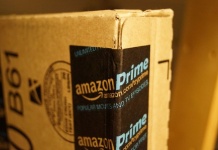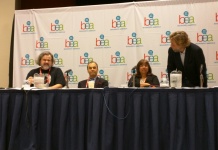 A few days ago we reposted the Authors Guild’s screed against Amazon Prime’s Kindle lending program, in which Prime subscribers can download one free e-book per month to a Kindle device. For publishers who did not sign on to take part in the program, Amazon actually buys the copy of the book that the subscribers download each time it is checked out.
A few days ago we reposted the Authors Guild’s screed against Amazon Prime’s Kindle lending program, in which Prime subscribers can download one free e-book per month to a Kindle device. For publishers who did not sign on to take part in the program, Amazon actually buys the copy of the book that the subscribers download each time it is checked out.
The “Big Six” publishers are exempt from this program, because the agency pricing agreements restrict Amazon from doing that sort of thing to their books—but since Amazon doesn’t have those agreements with any publishers except the Big Six, it can do this to their books with impunity, at least based on its reading of its contracts with the publishers. There are some publishers who have signed onto the program, getting a flat yearly fee per loaned title instead.
The Authors Guild objects to Amazon’s reading of the contracts with those publishers who did not sign onto the program, and feels that many of those who did sign on do not have the authority to license their authors’ books that way without explicit permission (and possibly an amended contract) from the authors. The Authors Guild entreats authors who find their books included in the program without their or their publisher’s authorization to contact the AG and its lawyers, so I imagine the Guild will probably file a lawsuit over the matter sooner or later.
The funny thing to me is how much this a recapitulation of the pricing practices that led the Big Six publishers to throw a snit at Amazon and demand agency pricing. Instead of losing a few bucks on each book, Amazon eats the entire wholesale price, holding down the monetary loss by limiting it to one title per Prime subscriber per month. Either way, the publishers and authors still get paid their standard royalties for each “lent” book.
The Authors Guild seems to be concerned over the same slippery slope that the Big Six were—the “devaluing” of e-books. I have a hard time seeing it, though. It’s not as if Amazon is handing them out free on street corners—just on a very restricted basis to people who have already plunked down a fairly substantial investment in an e-reader and paid a yearly fee for Amazon Prime. If it does get more people to buy e-readers and Amazon Prime, it makes the e-book market bigger and might just sell more e-books overall.
And, of course, physical libraries continue buying and lending out paper books on a much less restricted basis with impunity. And even in countries that have Public Lending Right payments, the PLR per checkout doesn’t amount to anything close to what Amazon is paying for each copy it lends out.
As with so many things, we’ll just have to wait and see what comes out of all of this. If the Authors Guild does file suit, it certainly won’t be the first time it’s done so.

































Why is this any different than Jane Reader gifting a Kindle copy to a friend? In fact, this is LESS a threat, because the gift only lasts a month.
It’s easy to get off the slippery slope. Pull your books from Amazon and start your own lending library on your own terms.
The First-Sale Doctrine allows a purchaser of a book to lend, resell, or give it away without requiring permission or further compensating the seller. If Amazon is willing to purchase as many copies of an eBook as they have Prime customers simultaneously checking it out, publishers and authors have no legal recourse, any more than they would have against a public library doing the same.
The “flat-fee” arrangement Amazon has made with several publishers is much more of a concern for authors, I would think. How is their share of this flat fee to be computed?
Most worrisome of all is what Amazon (or other commercial lenders) will ultimately do to damage the viability of the American public library system, a subject I treat at length on my blog at:
http://alltogethernow.org/showtag.php?currid=85
Publishers have a chip embedded in their spine which causes them to fly into a rage whenever anything unusual happens in the vicinity of their books. The chip’s first command is to shut down the frontal lobe.